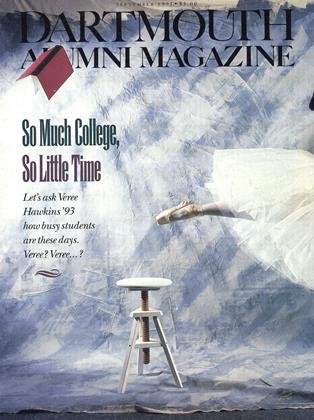1770
The original College code of laws discourages "that which is puerile, such as playing with balls, bowls, and other ways of diversion" in favor of "the practice of some manual arts, or cultivation of gardens and other lands at the proper hours of leisure." The rule is widely ignored as rival classes and literary societies play each other in football.
1778
In Dartmouth's first attempt at a correspondence course, Professor John Smith writes a series of letters to his students containing a full course in astronomy and geophysics.
1807
Five students organize the Handel Society in order "to improve and cultivate the taste, and promote true and genuine music and discountenance trifling unfinished pieces." The society fines members 25 cents for missing a meeting and half that amount for arriving late or leaving early.
1868
Intramural football is banned for two years because of "an attack upon the freshman class at the hour of recitation in the presence of members of the Faculty," according to an administrative edict.
1910
Playwright and critic Walter Eaton lambasts the Dartmouth Dramatic Club for touring the country with a play called "The Gold Mine" and "advertising the fact that the Dartmouth Dramatic Club exists merely for the purpose of having a good time, and not for the purpose of studying the drama as an art."
1911
Wallace Robinson, class of 1873, donates $1OO,OOO to construct a student center for intellectual activities. He hopes that the new building will "present a strong counterpoise to athleticism on the one hand and social cliques on the other." The center is completed in 1914.
1929
For want of an airplane, the newly formed Dartmouth Aeronautical Society grounds itself in lectures and discussions "on new phases of the flying game."
1954
Dartmouth and seven other schools formally agree to establish the Ivy League.
1962
President John Sloan Dickey '29 likens the newly opened Hopkins Center to the Agora of ancient Athens. John Scotford '38 writes in the Alumni Magazine that the building will be a great place to take a date.
1987
President James O. Freedman reminds the faculty that "an institution can be so well-rounded that it lacks any point at all."
1988
Concerned that students are not having the right kind of fun, the College institutes an annual $35 student activities fee. The $140,000 raised annually subsidizes athletic tickets and cultural activities at the Hopkins Center.
 View Full Issue
View Full Issue
More From This Issue
-
 Feature
FeatureAN EXAM? LET ME TRY TO PENCIL IT IN
September 1991 By JONATHAN DOUGLAS '82 -
 Feature
FeatureThe Gate keeper
September 1991 By Jim Collins '84 -
 Feature
FeatureELECTRIC BODY LANGUAGE
September 1991 By JAY HEINRICHS -
 Feature
FeatureBio Rhythms
September 1991 -
 Article
ArticleDR. WHEELOCK'S JOURNAL
September 1991 By E. Wheelock -
 Article
ArticleAFTER THE WALL
September 1991 By Professor Konrad Kenkel







